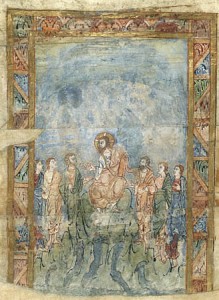Readings:
1 Samuel 26:2,7-9,12-13,22-23
Psalm 103:1-4,8,10,12-13
1 Corinthians 15:45-49
Luke 6:27-35

Davids and Sauls
The story of David and Saul in today’s First Reading functions almost like a parable. Showing mercy to his deadly foe, David gives a concrete example of what Jesus expects to become a way of life for His disciples. The new law Jesus gives in today’s Gospel would have us all become “Davids”—loving our enemies, doing good to those who would harm us, extending a line of credit to those who won’t ever repay us. The Old Law required only that the Israelites love their fellow countrymen (see Leviticus 19:18). The new law Jesus brings makes us kin to every man and woman (see also Luke 10:29-36). His Kingdom isn’t one of tribe or nationality. It’s a family. As followers of Jesus, we’re to live as He lived among us—as “children of the Most High” (see Luke 6:35; 1:35). As sons and daughters, we want to walk in the ways of our heavenly Father, to “be merciful, just as your Father is merciful.” Grateful for His mercy, we’re called to forgive others their trespasses because God has forgiven ours. In the context of today’s Liturgy, we’re all “Sauls”—by our sinfulness and pride we make ourselves enemies of God. But we’ve been spared a death we surely deserved to die because God has loved and shown mercy to His enemies, “the ungrateful and the wicked,” as Jesus says. Jesus showed us this love in His Passion, forgiving His enemies as they stripped Him of cloak and tunic, cursed Him and struck Him on the cheek, condemned Him to death on a cross (see Luke 22:63-65; 23:34). ”He redeems your life from destruction,” David reminds us in today’s Psalm.
That’s the promise, too, of today’s Epistle: That we who believe in the “last Adam,” Jesus, will rise from the dead in His image, as today we bear the image of the “first Adam,” who by His sin made God an enemy and brought death into the world (see 1 Corinthians 15:21-22).
Pope Benedict XVI Angelus Address, February 18, 2007
This Sunday’s Gospel contains some of the most typical and forceful words of Jesus’ preaching: “Love your enemies” (Lk 6: 27). It is taken from Luke’s Gospel but is also found in Matthew’s (5: 44), in the context of the programmatic discourse that opens with the famous “Beatitudes”. Jesus delivered it in Galilee at the beginning of his public life: it is, as it were, a “manifesto” presented to all, in which he asks for his disciples’ adherence, proposing his model of life to them in radical terms.
But what do his words mean? Why does Jesus ask us to love precisely our enemies, that is, a love which exceeds human capacities?
Actually, Christ’s proposal is realistic because it takes into account that in the world there is too much violence, too much injustice, and therefore that this situation cannot be overcome except by countering it with more love, with more goodness. This “more” comes from God: it is his mercy which was made flesh in Jesus and which alone can “tip the balance” of the world from evil to good, starting with that small and decisive “world” which is the human heart.
This Gospel passage is rightly considered the magna carta of Christian non-violence. It does not consist in succumbing to evil, as a false interpretation of “turning the other cheek” (cf. Lk 6: 29) claims, but in responding to evil with good (cf. Rom 12: 17-21) and thereby breaking the chain of injustice.
One then understands that for Christians, non-violence is not merely tactical behaviour but a person’s way of being, the attitude of one who is so convinced of God’s love and power that he is not afraid to tackle evil with the weapons of love and truth alone.
Love of one’s enemy constitutes the nucleus of the “Christian revolution”, a revolution not based on strategies of economic, political or media power: the revolution of love, a love that does not rely ultimately on human resources but is a gift of God which is obtained by trusting solely and unreservedly in his merciful goodness. Here is the newness of the Gospel which silently changes the world! Here is the heroism of the “lowly” who believe in God’s love and spread it, even at the cost of their lives.
